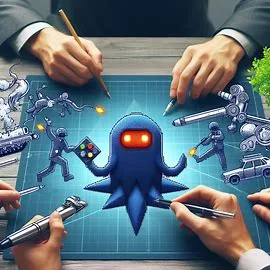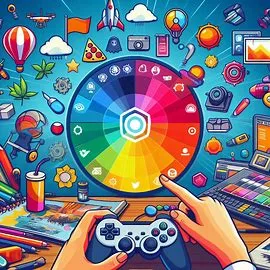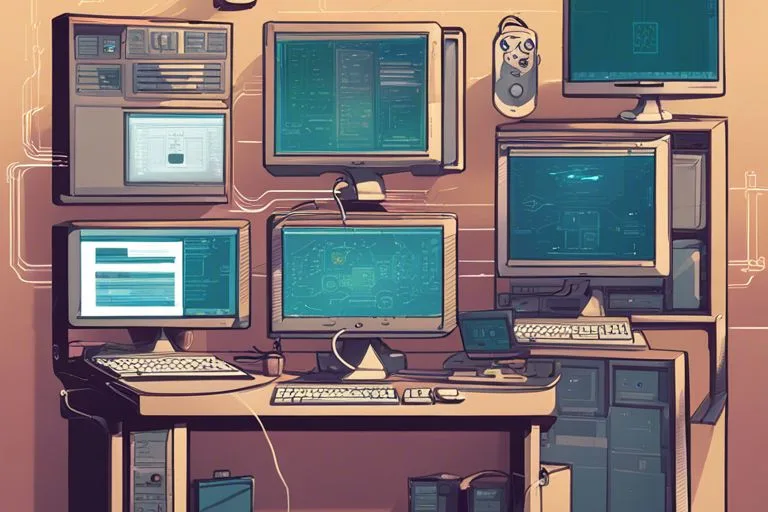How to Choose the Best Game Engine for Your Project?
Embarking on a new game development project can be an exciting yet daunting task, especially when it comes to selecting the right game engine to bring your vision to life.
With a plethora of options available in the market, making the correct choice is crucial for the success of your game. In this comprehensive guide, we will probe into the vital factors you need to consider when choosing the best game engine for your project.

What is a Game Engine?
Your journey into the world of game development begins with understanding game engines. A game engine is a software framework that provides developers with the necessary tools and functionalities to create video games. It encompasses a range of features such as rendering, physics, scripting, AI, networking, and more.
Essentially, a game engine serves as the backbone of any game development project, allowing developers to focus on creating the game itself rather than building every element from scratch.
Game engines come in various shapes and sizes, catering to the needs of different types of games and developers. They often provide a visual development environment, asset management tools, and compatibility with different platforms.
Using a game engine can significantly speed up the development process and streamline workflows, making it an imperative tool for both indie and AAA game developers.
Core Features of Game Engines
With numerous game engines available in the market, it’s crucial to understand the core features that define them. These features include graphics rendering capabilities, physics simulation, audio support, scripting languages, and tools for asset importing and management.
The ability to deploy games on multiple platforms, scalability for projects of different sizes, and accessibility for developers with varying levels of experience are also key considerations.
Game engines empower developers to bring their creative visions to life by providing a comprehensive suite of tools and functionalities under one roof. They offer ready-made solutions for common challenges in game development, such as handling complex graphics, optimizing performance, and managing game assets.
Choosing the right game engine for your project can make a significant impact on the development process and the final quality of your game.
Setting the Foundation

One of the first steps in choosing the best game engine for your project is defining your project goals. Before entering into the technical aspects, take a step back and consider what you want to achieve with your game. Are you aiming for a simple mobile game, or a complex AAA title? Understanding your project goals will help streamline the decision-making process when selecting a game engine.
Consider factors such as the scope of your project, target audience, budget, and timeline. Are you looking to develop a multiplayer online game, or a single-player experience? Do you prefer 2D or 3D graphics? By clearly defining your project goals, you can narrow down the list of potential game engines that align with your vision.
Genres and Platforms
One of the key considerations when choosing a game engine is genres and platforms. Different game engines are optimized for specific genres and platforms. For example, if you are developing a 2D platformer game for mobile devices, you may want to consider game engines that excel in 2D graphics and mobile optimization. On the other hand, if you are working on a virtual reality game, you will need a game engine that supports VR technology.
Setting the foundation for your project by considering the genres and platforms you are targeting will help narrow down your options and ensure that you choose a game engine that is best suited for your specific needs.
Evaluating Technical Criteria
Keep in mind that the language and scripting options supported by a game engine can have a significant impact on the development process. Some engines may support a specific programming language, while others offer a range of scripting options.
It is necessary to consider your familiarity with the language or scripting options available in the engine, as this can affect the ease and speed of development.
Analyze how well the engine supports the integration of external libraries and tools that you may need for your project. Look for an engine that allows flexibility in terms of language and scripting options, enabling you to work with the tools and libraries that best suit your project’s requirements.
Graphics and Rendering Capabilities
Graphics and rendering capabilities are crucial aspects to consider when evaluating a game engine. The engine’s ability to handle complex graphics, rendering techniques, and performance optimization can significantly impact the visual quality of your game.
Evaluate the engine’s support for rendering pipelines, shading languages, and lighting systems to determine if it aligns with your project’s visual requirements.
Graphics and rendering capabilities also include support for different platforms and devices, ensuring that your game can run smoothly and effectively on various hardware configurations. Consider the engine’s compatibility with VR and AR technologies if your project involves immersive experiences.
Plus, when assessing graphics and rendering capabilities, pay attention to the engine’s performance optimization features, as they can greatly impact the overall gameplay experience. Opt for an engine that provides tools and techniques for efficient rendering and resource management, enhancing both visual quality and performance.
Analysis of Costs and Resources
Once again, before submerging into the development process, it is crucial to analyze the costs and resources involved in using a particular game engine. Understanding the financial implications and resource requirements can help you make an informed decision that aligns with your project goals.

Budget Considerations
Resources play a significant role in determining which game engine is the best fit for your project. Consider factors such as licensing fees, subscription costs, and any additional expenses associated with the engine. Some engines offer free versions with limitations, while others require a one-time purchase or a monthly subscription.
It’s important to evaluate your budget and choose an engine that offers the features you need at a price point that suits your financial capabilities.
When assessing budget considerations, also take into account potential additional costs for plugins, extensions, or specialized tools that may be necessary for your project. These add-ons can enhance the functionality of the game engine but may come at an extra cost. Make sure to factor in these expenses when determining the overall budget for your game development.
Asset Store and Additional Tools
On top of the base features offered by a game engine, the availability of an asset store can be a valuable resource for developers. Asset stores offer a wide range of pre-made assets, such as 3D models, sound effects, and scripts, that can accelerate the development process and improve the quality of your game.
Additionally, some engines provide access to additional tools and plugins through their marketplace, allowing you to customize your development environment and streamline your workflow.
Considerations for utilizing asset stores and additional tools include assessing the quality of assets, compatibility with your chosen game engine, and the cost of purchasing or licensing these resources. By leveraging asset stores and supplementary tools, you can save time and resources while enhancing the overall production value of your game.
Community and Support

When choosing a game engine for your project, it’s crucial to consider the level of community and support that surrounds it. A strong and active community can provide valuable resources, assistance, and inspiration throughout the development process.
Online Communities and Forums
Communities surrounding a game engine can be a treasure trove of knowledge and support for developers. Online forums, subreddits, Discord servers, and social media groups dedicated to a specific game engine offer a platform for users to ask questions, share ideas, and troubleshoot issues.
Participating in these communities can help you connect with experienced developers, gain insights into best practices, and stay updated on the latest developments in the industry.
Participating actively in online communities can also help you build relationships, network with potential collaborators, and showcase your work. By engaging with others in the community, you can receive feedback on your project, learn from others’ experiences, and even find opportunities for collaboration or employment in the game development field.
Documentation and Tutorials
Communities of game engines often provide extensive documentation and tutorials to help users navigate the complexities of the software. Comprehensive documentation can serve as a valuable resource for developers of all skill levels, offering guidance on how to use various features, troubleshoot common issues, and optimize performance.
Additionally, tutorials created by community members can offer step-by-step guidance on how to achieve specific tasks or implement certain functionalities within the game engine. These tutorials can range from beginner-level introductions to advanced techniques, catering to a wide audience of developers looking to enhance their skills.
Support: It’s crucial to choose a game engine with strong community support to ensure that you have access to resources, assistance, and guidance throughout the development process. Whether you’re a seasoned developer or a newcomer to game development, a supportive community can make a significant difference in your ability to overcome challenges and achieve success in your projects.
The Importance of Scalability and Futureproofing
Many aspects need to be considered when choosing the best game engine for your project, and scalability and futureproofing are two critical factors that should not be overlooked. A successful game engine should be able to grow with your project and adapt to new technology trends, ensuring that your game remains relevant and competitive in the ever-evolving gaming industry.
Cross-Platform Support
Importance – One of the key aspects of scalability is the ability of a game engine to support multiple platforms. Cross-platform support ensures that your game can reach a wider audience by being available on various devices such as PC, consoles, and mobile. This adaptability is necessary for maximizing the game’s reach and potential revenue streams.
Dangerous – Choosing a game engine with limited cross-platform support can severely limit your game’s accessibility and success. Ensure that the engine you select has a proven track record of supporting multiple platforms and can easily adapt to new ones that may emerge in the future.
Engine Updates and Longevity
Longevity – Game engines that receive regular updates and improvements demonstrate commitment to longevity and futureproofing. Regular updates not only enhance the engine’s performance and capabilities but also ensure compatibility with new hardware and software advancements.
Cross Platform – When considering engine updates and longevity, it is crucial to prioritize ongoing support and development. Choose a game engine that has a history of consistent updates and a roadmap for future enhancements to guarantee that your project remains competitive and up to date in the fast-paced gaming industry.
Hands-On Experiences
After researching and narrowing down your list of potential game engines, it’s time to get your hands dirty with some demos and trial versions. Many game engines offer free demos or trial versions that allow you to test out the functionalities and features before committing to a purchase. This hands-on experience is crucial as it gives you a real feel for the workflow, interface, and capabilities of the engine.
Exploring demos and trial versions can help you determine if a game engine is user-friendly, provides the necessary tools for your project, and aligns with your skill level. Take the time to experiment with different features and see how intuitive the engine is for your specific needs.
Prototyping and Testing
Versions Any game engine can look promising on paper, but the true test lies in prototyping and testing. Once you’ve selected a few top contenders, it’s time to start prototyping your game idea using these engines. Creating prototypes allows you to test the performance, scalability, and overall feasibility of your project in a practical setting.
Prototyping can help you identify any limitations or challenges early on in the development process. Use this phase to gauge how quickly you can turn your ideas into working game elements and how well the engine can handle your game’s mechanics and graphics.
Prototyping and testing are crucial stages in the game development process. By building small, focused prototypes, you can gain valuable insights into how each game engine performs under real-world conditions. This hands-on approach helps you make informed decisions about which engine is the best fit for your project’s requirements.
Making the Decision
Unlike choosing what to have for dinner, selecting the best game engine for your project requires a more analytical approach. To assist in your decision-making process, it is crucial to compare the options available to you. This will help you weigh the pros and cons of each engine based on your specific project requirements.
| Option | Description |
| Unity | Popular and versatile engine with a large community and extensive asset store. |
| Unreal Engine | Powerful and visually stunning engine known for its AAA games and cinematic capabilities. |
| Godot | Open-source engine with a focus on user-friendly interface and flexibility. |
Tips for Making the Final Choice
Options can be overwhelming, but with the right approach, you can confidently make the final decision on the best game engine for your project. Consider factors such as platform compatibility, learning curve, community support, and licensing costs to narrow down your choices.
- Platform Compatibility – Ensure the engine supports the platforms you intend to launch your game on.
- Learning Curve – Evaluate your team’s skill level and willingness to learn new technologies.
- Community Support – Look for active forums, tutorials, and resources provided by the engine’s community.
To ensure a successful outcome, it’s imperative to make an informed decision based on your project’s needs and your team’s capabilities. Invest time in researching and testing the engines to mitigate risks and maximize productivity. Any decision made should align with your long-term goals and objectives.
Final Words
Conclusively, selecting the right game engine for your project is a crucial decision that will significantly impact the development process and the final outcome. By carefully evaluating your project requirements, considering factors such as budget, expertise, platform compatibility, and scalability, you can make an informed decision on the best game engine to use.
Remember to also take into account the community support, documentation, and available resources to ensure a smooth development journey.
With the plethora of options available in the market, it can be overwhelming to choose the best game engine for your project. However, by following the comprehensive guide provided and conducting thorough research, you can confidently select the game engine that aligns with your vision and goals.
Keep in mind that the best game engine is one that meets the unique needs of your project and empowers you to bring your game idea to life successfully.

